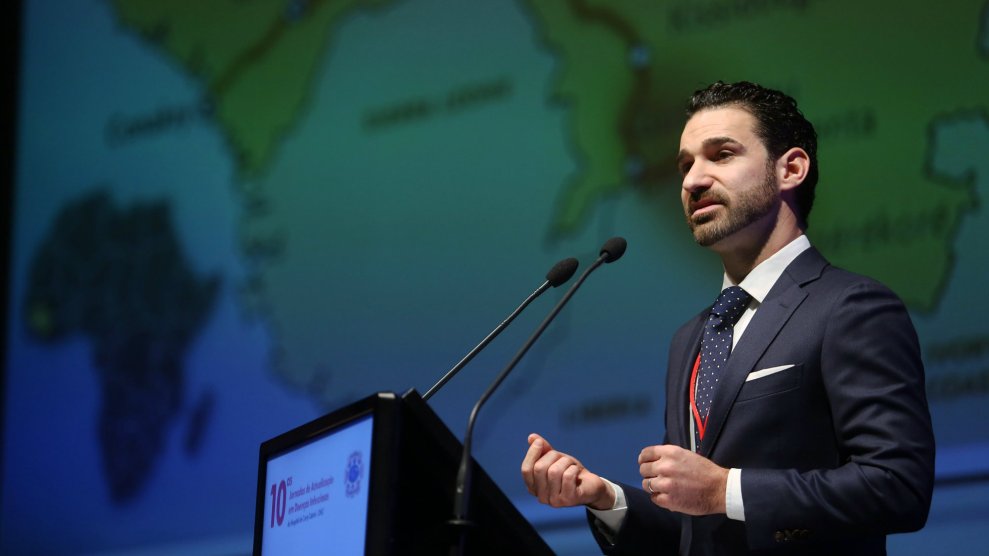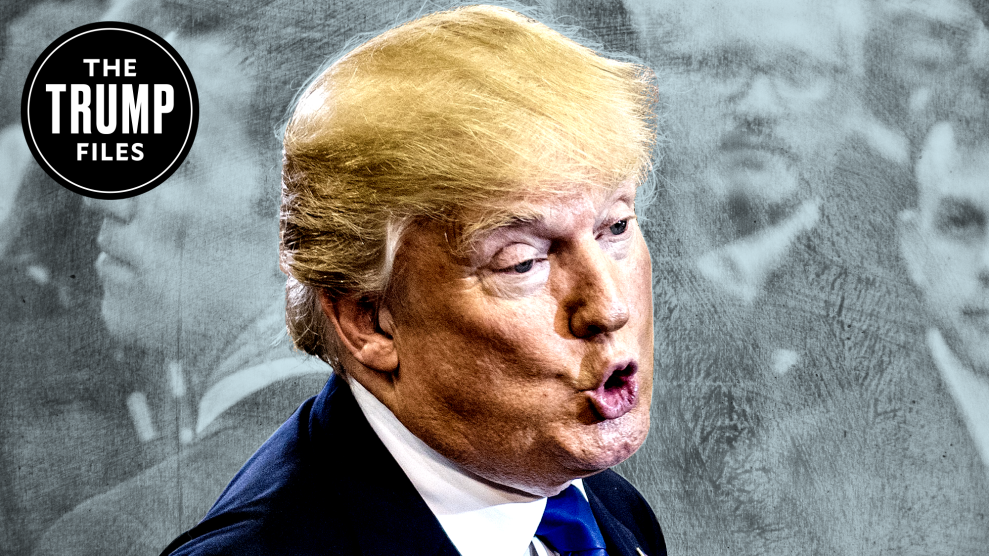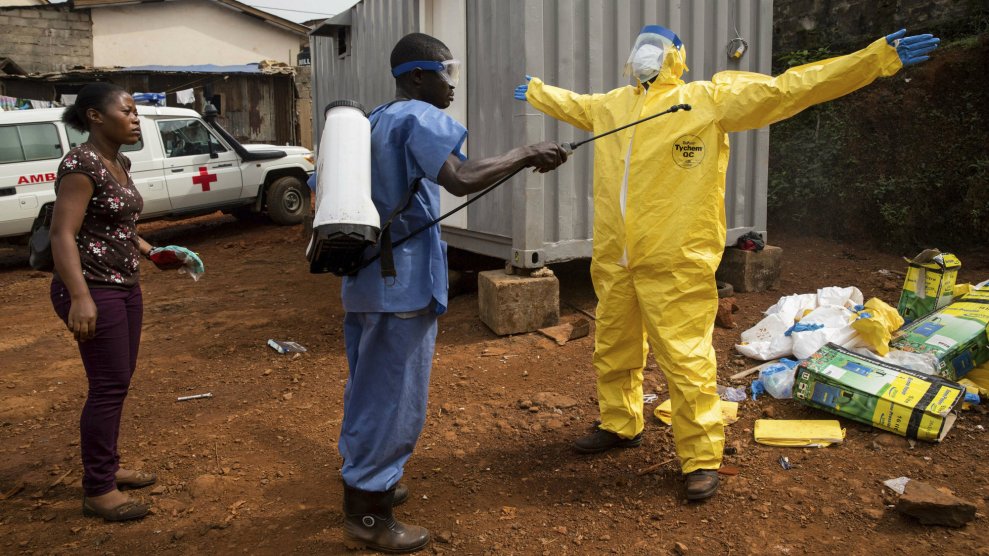
Dr. Craig Spencer speaking at a conference on infectious diseases in 2016.Diana Quintela/Atlantico Press/ZUMA
In November 2014, Dr. Craig Spencer walked out of New York’s Bellevue Hospital cured of Ebola. He was the last American diagnosed with the disease in the US.
During the nearly three weeks Spencer spent in the hospital, his liver started to fail, and he lost 20 pounds. But thanks to the treatment he received, including an experimental drug and plasma donated by a patient who had recovered from Ebola, he overcame a disease that would claim more than 11,300 lives during the West Africa Ebola epidemic. Of the 11 patients treated in the US, two died. One was a Liberian man visiting family in Texas who had initially been misdiagnosed at a Dallas hospital. The other was a surgeon from Sierra Leone and a permanent resident of the United States who arrived at a Nebraska hospital in critical condition; he died two days later.
The Ebola epidemic that infected Spencer was declared over in 2016, but the disease routinely flares up. During a current outbreak in the Democratic Republic of the Congo, 26 people have already died.
Spencer, an emergency medicine doctor, caught Ebola while treating patients for Doctors Without Borders in Guinea. He didn’t show any symptoms when he first returned to New York, but after developing a low fever, Spencer rushed to Bellevue, where he was diagnosed. The 36 hours he spent in New York City before entering the hospital were quickly scrutinized, and generated panic that he might have spread the disease. He even caught the attention of Donald Trump, who tweeted:
The Ebola doctor who just flew to N.Y. from West Africa and went on the subway, bowling and dining is a very SELFISH man-should have known!
— Donald J. Trump (@realDonaldTrump) October 24, 2014
Though Spencer was chastised for riding the subway, eating out, and going bowling, experts say it is virtually impossible for someone to spread the Ebola virus before they have symptoms. No one else in the city tested positive for Ebola.
Spencer is now the director of global health in emergency medicine at New York-Presbyterian-Columbia University Medical Center, provides clinical care in New York, and works internationally in public health. I spoke with him about his experience with Ebola from his perspectives as a doctor and a patient. He also reflected on America’s response to the Ebola epidemic, and his concern that we are unprepared for the next outbreak.
Mother Jones: Tell me about the work you were doing in Guinea to fight Ebola.
Craig Spencer: I was deployed on behalf of MSF [Médecins Sans Frontières, also known as Doctors Without Borders] to Guéckédou, Guinea, near the epicenter of the outbreak to work as a physician in an Ebola treatment center. The center had opened earlier in the year and was staffed with a really awesome team of primarily Guinean nurses and doctors. MSF had asked a couple of outsiders like myself to come in and fill the ranks. I went in September 2014 and spent about six weeks there before coming back to the US.
MJ: Do you have any idea of when you contracted the disease?
CS: No. I tell people that it was likely from one of the dozens of patients we saw who were extremely sick, suffering from a lot of diarrhea and vomiting. We know that the protections are nearly perfect, but 99.9 percent is not 100 percent. It may have been working clinically or out in the community. There was never a known breach of protocol or exposure that any of us are aware of.
MJ: When you returned to the United States, you didn’t have symptoms for a few days. What happened next?
CS: I followed protocols that involved twice daily temperature monitoring and recording. Doctors Without Borders has been working with Ebola for quite some time and developed protocols that basically said, if you don’t have a fever, you should carry on living your life as normal—with the understanding that the time you spent working at an Ebola treatment center is pretty devastating and depressing and can really impact people’s mental and physical health.
It’s important to get back into society and do the things that make you feel well, with the understanding that you are not infectious. We know that without a fever the likelihood of transmitting Ebola seems to be nil. I had no symptoms when I got back. I was just exhausted and depressed from everything I had seen, but nothing that suggested I was infected myself. When I developed a fever I immediately went to Bellevue Hospital, where I was diagnosed with Ebola.
MJ: There was public panic that you might have spread the disease before you entered the hospital. You rode the subway, ate out, and went bowling. What was your reaction to the panic?
CS: I was in the hospital at that point and had more concerning things to worry about, namely getting well. I wasn’t exposed to a lot of the media and had no idea what was going on. Now, I think the way that we as a country responded to Ebola was reactive rather than proactive. Much like with other epidemics in the past, we responded with fear rather than with a strong discussion of the risk, a strong discussion of the scientific principles, and attempts to educate the public on what was actually happening in West Africa. Everyone was going to be safest if the epidemic was put out in West Africa, and we were focusing on whether or not you could get Ebola from a bowling ball. I think that was a big mistake, and unfortunately I’m not sure we have learned our lesson for the next epidemic.
MJ: You’ve written that quarantines for returning Ebola volunteers put in place by the governors of New York and New Jersey set a dangerous precedent. How did politics play into the response to the Ebola epidemic?
CS: The timing was quite unfortunate given that it was right before midterm elections and politicians very happily took advantage of that situation to appear presidential, as opposed to focusing on public health. As every public health student knows, all of your public health interventions, despite their good intentions, may have unforeseen consequences. A lot of politicians were talking about how they were going to be tougher than the official recommendations or stronger than what the CDC recommended, and it may have appeared to have been a smart approach. In fact, it came with serious consequences, which politicians didn’t necessarily have to deal with. But the public health precedent has been set. I think we have really set ourselves up for inefficiencies and disappointment the next time an epidemic breaks out globally and maybe even impacts us in the US.
MJ: In 2014, Donald Trump tweeted that Ebola patients should be kept out of the country, adding that “people who go to far away places to help out are great” but should “suffer the consequences.” He also suggested that flights from Africa should be canceled. What is the impact of that rhetoric from Trump?
CS: It was already difficult enough to get people to be able to go because of the restrictions put in place by universities, by medical centers, by clinics, to send nurses and doctors. It was already tough for people to get time off, including the 21 days after [they returned] when they weren’t allowed to go back to work. Adding the possibility that someone who goes to the source of an outbreak to help save others and help save other Americans can’t come home is damaging. Unfortunately, the impact of that policy would be that fewer people would be willing to go, the epidemic would continue longer, and the risk to people in the US would be considerably higher.
At the beginning of the Ebola outbreak, at the hospital where I was treated—Bellevue Hospital in New York—there were around 1,700 doctors. The number of doctors who were working in Guinea, Liberia, and Sierra Leone combined at the beginning of the outbreak was 1,600—so fewer than at the one hospital where I was treated. Up to 8 percent of responders in places like Liberia died of Ebola during the outbreak. I survived because I was young and healthy and treated in a Western environment.
MJ: If you were asked to respond to the Ebola outbreak in the Democratic Republic of the Congo, would you go?
CS: Absolutely. The number of people who have the training to treat Ebola—granted it’s bigger than it was in 2014—is still quite small. And, at least theoretically, I have acquired antibodies that should protect me from reinfection. I went back to Guinea in 2015, as well. MSF treated me just like everybody else in terms of risk of exposure and precautions. If the need arose again, and I could be helpful, absolutely.
MJ: What is America’s role in fighting an outbreak on another continent?
CS: There is not only a huge moral requirement, but also a human resource inequality that is going to require places like the US and Europe and others to send physicians and health care workers to outbreaks. A lot of times they just can’t be handled with insufficient resources. So the president saying that it’s fine that people go somewhere to help put out an epidemic, but they are not allowed back in the country, that’s crazy—especially given that I have an American passport and ostensibly anyone else that would be coming back is an American citizen.
Physicians and health workers are ultimately protecting the people at the source of the outbreak, the larger global community, and Americans themselves. If we sent nothing and no one to West Africa during the Ebola outbreak, it would have simmered longer, it would have been more detrimental to their population, and the risk that it would have spread would have been considerably higher. If this administration, in the event of another epidemic, approaches it like we think they would based on tweets, the outcome would be a pure disaster.
MJ: What are some of the reasons you think the “outcome would be a pure disaster”?
CS: The US response to the Ebola epidemic was by no means perfect, but I expect it would be marked much, much better than any response that this administration would be able to make right now. We’re just not prepared. Trump wants to pull back money that was meant for this response, and the person who would be the US head of a pandemic response left around the same time. That’s not to make people fearful, that’s to make people realize we need to advocate for our own safety. Preparedness is key. We are setting ourselves up for a really dangerous situation in the US in the event of a pandemic.














